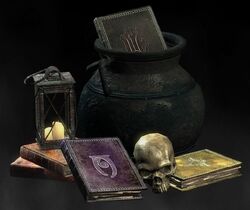
Spell Tomes from various schools of magic
- For the essence consumed when casting spells, see Magicka.
- "Whoa, whoa, whoa! Watch the magic!"
- ―Hold Guard[src]
Magic, also known as the Clever Craft,[1] and the Arcane Arts[2] is the art or ability to alter the world through magicka. Magic is the manipulation of magicka in order to directly control reality in some way. The individual casting of this force to form a mystical effect is called a spell. A practitioner of magic is generally called a mage, and one who fights with both melee weapons and magic is a battlemage or a spellsword. Those who prefer magical and thief skills are called nightblades. Although all races generally possess some degree of magical aptitudes, those with elvish blood in particular far outshine the others. Magic is governed by the Intelligence and Willpower attributes.
By game[]
- Magic (Arena)
- Magic (Daggerfall)
- Magic (Morrowind)
- Magic (Oblivion)
- Magic (Skyrim)
Background and history[]
Magic is usually associated with Magnus, the god of sorcery,[3][4] and it is believed that magic is what is left of him on the world.[4] Because Magnus escaped from Mundus, it is thought that magic has no limits.[5] Magic originates from Aetherius,[6] from which it passes through the sun and the stars and reaches Mundus.[6][7] Magic was purportedly first used by men during the month of Rain's Hand, which is also the season of the Mage. People born under the sign of the mage have more magicka and talent for spellcasting.[8] People born under the sign of The Apprentice have a special affinity to magic and are more vulnerable to it, and people born under the sign of The Atronach are natural sorcerers with vast reserves of magicka, but they cannot generate magicka on their own.[8]
Throughout the Merethic Era and the First Era magic was practiced mostly by solitary individuals or hermits. There were only a handful communities of mages who banded together for the purpose of magical research. The most notable of these groups were the Psijics, who offered counsel to the rulers of the Summerset Isles, thus only the mages themselves and the aristocarcy had access to the use of magic.[9] Archmage Shalidor purportedly classified magic into schools and founded the College of Winterhold to set higher standards among mages and discourage the use of magic among common castes. Despite the dubious nature of these claims,[10] Shalidor did found the College of Winterhold as well as schools of magic.[11][12] During the early Second Era, the former Psijic Vanus Galerion founded the Mages Guild, a group of mages who worked collectively on magical research, and provided magical services for the public, a revolutionary idea at the time.[9]
Types of magic[]
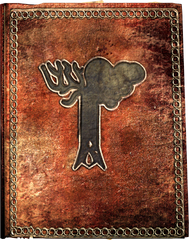
Alteration skill book
- "The six major avenues of magical research: alteration, restoration, thaumaturgy, illusion, destruction, and mysticism. For a description of each, see the Skills section."
- ―Schools of Magicka description in Daggerfall[src]
The schools of magic are classifications of spells that were adopted by the Mages Guild to help beginning spellcasters develop a better understanding of magic by providing a structure that is easy to comprehend.[13] The first known use of the modern schools of magic was by the Shad Astula academy, who devised the system only for the purpose of teaching introductory magic to beginners.[2] The model has proven to be efficient and a petition by Gabrielle Benele was made around 2E 582 to Vanus Galerion, archmage of the mages guild at the time, to adopt the system into the Mages Guild's study program.[13] The schools of magic devised by Shad Astula include:
Despite the easily understood structure of the schools, they are considered arbitrary classifications, as magic is an entirely mutable art. Some spells appear to fit into several of these schools, and some of the schools themselves were possibly combined.[13]
There are also more obscure forms of magic that have appeared in the series:
- Ayleid/Aetherial magic
- Blood magic
- Green Singing
- Flesh magic
- Necromancy
- Shadow magic
- Shehai
- Soul magic
- Thu'um
- Tonal magic
- In Oblivion
Other arcane arts[]
Powers[]
Powers are magical effects that can be used by people to produce unique and powerful magical effects. They differ from spells in that Powers have zero Magicka cost, are not learned from Spell Tomes, and some can only be used once per day. Different races have their own unique, specific power(s), but all races can gain powers from completing a quest for someone, or from various crafted armor, clothing and other apparel, and/or from unique magical artifacts. Basically, while a spell is a learned technique to channel magic, a power is naturally gifted to the user.
Abilities/Active Effects[]
Abilities/Active Effects are magical effects that, once obtained, are constantly active and increase various statistics and values relative to the person who has them. Abilities/Active Effects differ from Powers in that they do not require activation and are not restricted to once-per-day uses like some powers are. Different races have their own unique abilities, but all races can acquire abilities by completing a quest for someone, or from armor and other apparel that was crafted, clothes that were made, and/or from unique magical artifacts or relics.
Enchanting[]
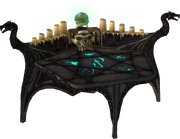
The art of enchanting involves adding a magical enchantment to a regular item, causing it to have special effects when used. An enchantment is a spell sealed, trapped into an object to confer mystical attributes, which are supported by Souls. To create an enchanted item, one must have an unenchanted item, a soul gem of the desired size, and a specific enchantment that is known and can be placed on the item. Any type of unenchanted item can be enchanted, whether it be weapons, armor, clothing and/or jewelry.
Alchemy[]
The art of Alchemy does not actually use the essence of magicka, but mages and non-mages associate alchemy with the arcane arts and magicka. Alchemy is the study and use of many materials with powers that may influence the flow of magicka in the world.
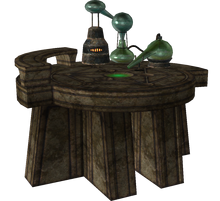
Alchemy Lab
Alchemy involves an interface system known as an alchemy lab, and takes multiple ingredients and mixes them together to create potions. Several different parts of an alchemy lab determine the many variables and results of making a potion. A mortar and pestle is a bowl and grinding tool used for physically and mechanically breaking down alchemical ingredients into powders, pulps or juices used in alchemical operations. A retort is a vessel with a beaked cap or head used to transform, purify, clean or refine raw ingredients into more refined substances used in alchemical preparations.
A calcinator is a stove or crucible used to reduce metals and other refined substances to ash so their arcane properties can be separated from the ash. It is also used to increase the magnitude of all known effects of the specific item.
An alembic is a double glass container in which the arcane properties of raw, refined, arcane, non-arcane and supernatural substances are distilled from their raw ingredients. The materials are infused, then heated until vapor is produced; then, the vapor moves to and condenses in the other container, precipitating the distilled materials with the desired alchemical and magical effects.
Classes[]
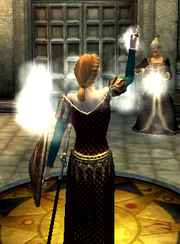
Magic is the specialization of the following playable classes in Morrowind and Oblivion:
In both games, custom classes can be created which employ magic as a specialization.
Magic items[]
Reality need not be influenced by spell-casting; spells can be imbued into objects. These objects can then be used to influence reality. Imbuing items with magical effects is called "enchanting." Those without magical affinities can still use these objects. Objects imbued with magic often have limited uses, expiring or becoming destroyed when the final charge is used. Few exceptions can be recharged; for example, weapons enchanted with magic and staves. Armor, clothing, jewelry often bear a constant effect which never expires. In Cyrodiil, members of the Arcane University can enchant items using an Altar of Enchanting. Citizens of Skyrim enchant using tables known as Arcane Enchanters.
Types of magical items[]
Magical stones[]
Magical stones are naturally occurring, organic substances that possess magical properties. These fall into four categories.
- Snow Elf architecture
- Wayshrines – Wayshrines are large, magical, dome-like architectural structures created by the Snow Elves to quickly traverse between specific locations. The wayshrines in the Forgotten Vale are primarily used to access the Inner Sanctum.
- Paragon Platforms – Paragon Platforms are another type of magical structures created by the Snow Elves. The only identified paragon platform has been seen in the Forgotten Vale; paragon platforms are used to access different parts of the Forgotten Vale with the Vale itself. In order to access a specific location through a Paragon Platform with the Forgotten Vale, one must have the correct paragon in order to access it.
- Ayleid Ruins – These special stones can be retrieved from various ruined sites of the now extinct Ayleid civilization. They are said to be made of meteoric glass (which in turn is supposedly part of the body of Lorkhan). When activated, they bestow certain magical effects upon the user. These are:
- Enchanting stones – Used to create and recharge enchanted items.
- Sigil Stone – Only found in the plane of Oblivion.
- Soul Gem – Found almost anywhere there is loot to be had, also can be found filled and unfilled in magic shops or mined in special locations such as Blackreach.
- The fourth type are stone pillars that can be found in various parts of Cyrodiil and Skyrim which bestow powers from the heavens when activated.
Unique magical artifacts[]
Weapons and apparel[]
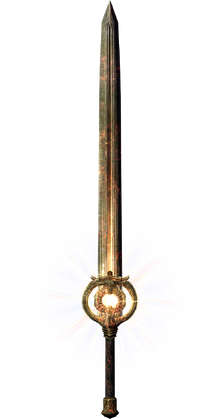
Dawnbreaker
- Staff of Magnus
- Saarthal Amulet
- The Gauldur Amulet
- Necromancer Amulet
- Dawnbreaker
- Ring of Phynaster
- Warlock's Ring
- Denstagmer's Ring
- Chrysamere
- Ice Blade of the Monarch
- Fang of Haynekhtnamet
- Umbra
- Goldbrand
- Skull Crusher
- Staff of Hasedoki
- Hevnoraak's Staff
- Dawnguard Rune Axe
- Dawnguard Rune Hammer
- Dawnguard Rune Shield
- Wuuthrad
- Auriel's Bow
- Auriel's Shield
- Bloodworm Helm
- Fists of Randagulf
- Lord's Mail
- Helm of Oreyn Bearclaw
- Eleidon's Ward
- Aetherial artifacts
- Rings of Blood Magic
- Amulets of Night Power
- Vampiric Ring
Books and scrolls[]
Miscellaneous[]
Notable mages[]
Ancient mages[]
- Hevnoraak (Ancient Nord/Atmoran) (Dragon Priest)
- Ahzidal (Ancient Nord/Atmoran) (Dragon Priest)
- Curalmil (Alchemist) (Ancient Nord/Atmoran)
Court wizards of Skyrim[]
- Madena (Dawnstar)
- Calcelmo (Markarth)
- Wylandriah (Riften)
- Sybille Stentor (Solitude)
- Farengar Secret-Fire (Whiterun, City)
- Wuunferth the Unliving (Windhelm)
College of Winterhold[]
Current[]
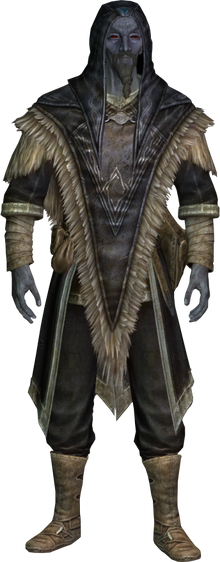
Arch-Mage Savos Aren
Faculty members[]
- Tolfdir (professor of Alteration, later Master Wizard after The Eye of Magnus)
- Mirabelle Ervine (Master Wizard)
- Savos Aren (Arch-Mage)
- Drevis Neloren (professor of Illusion)
- Faralda (professor of Destruction)
- Phinis Gestor (professor of Conjuration)
- Colette Marence (professor of Restoration)
- Sergius Turrianus (professor of Enchanting)
- Enthir (black market)
- Urag gro-Shub (archivist and librarian)
- Augur of Dunlain
- Arniel Gane
- Bernadette Bantien (author of Amongst the Draugr)
- Talsgar the Elder (author of Lost Legends)
- Tredayn Dren (author of The Legend of Red Eagle)
Students[]
Former[]
- Falion
- Festus Krex [14]
- Septimus Signus[15]
- Calixto Corrium[16]
- Orthorn
- The Caller
- Nelacar
- Malyn Varen
- Shalidor (deceased)
- Geirmund[17] (deceased)
- Gauldur[17] (deceased)
- Takes-In-Light (deceased)
- Borvir (deceased)
- Ilas-Tei (deceased)
- Atmah (deceased)
Sources[]
Illusion[]
Alteration[]
Conjuration[]
Destruction[]
Restoration[]
Mysticism[]
Enchanting[]
Alchemy[]
- Herbalist's Guide to Skyrim
- Song of the Alchemists
- De Rerum Dirennis
- Mannimarco, King of Worms
- A Game at Dinner
- Fundamentals of Alchemy
- Sinderion's Field Journal
- The Nirnoot Missive
- 36 Lessons of Vivec, Sermon 2
- 36 Lessons of Vivec, Sermon 18
References[]
- ↑ Dialogue with Tsun
- ↑ 2.0 2.1 Shad Astula Curriculum
- ↑ Before the Ages of Man
- ↑ 4.0 4.1 Varieties of Faith: The High Elves
- ↑ Monomyth: The Heart of the World
- ↑ 6.0 6.1 Dialogue with Girnalin
- ↑ Mysteries of the Mundus Stones
- ↑ 8.0 8.1 The Firmament
- ↑ 9.0 9.1 Origin of the Mages Guild
- ↑ A Minor Maze
- ↑ Shalidor's Shrouded Realm loading screen
- ↑ Dialogue with Shalidor during Long Lost Lore
- ↑ 13.0 13.1 13.2 Proposal: Schools of Magic
- ↑ Dialogue with Festus Krex
- ↑ Dialogue with Urag gro-Shub
- ↑ Butcher Journal 1
- ↑ 17.0 17.1 Daynas Valen's Notes
